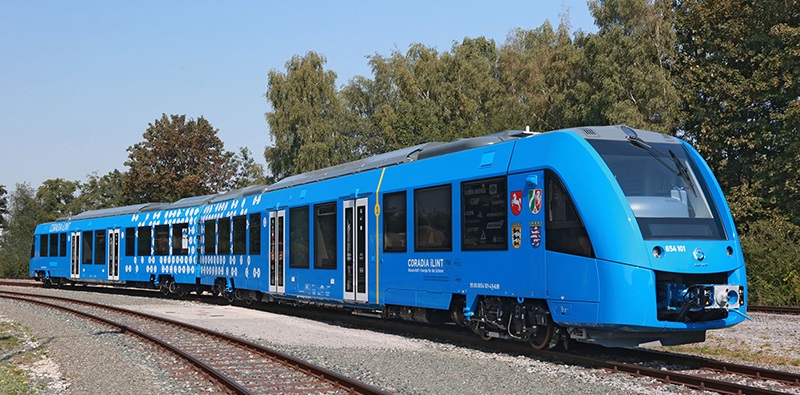
The Workshop was held on 17 May 2019 in Brussels and showcased a study commissioned by the FCH-JU and Shift2Rail. It has been followed by a Video published on 11 June and available on the FCH-JU website and YouTube.
The Study emphasises the wish of many EU Member States to phase out diesel trains and replace them with Alternative Fuels such as hydrogen. The Executive Summary argues that FCH trains are ” a versatile zero emission technology” and “is well positioned to help Europe reach its greenhouse gas, air contaminant and noise reduction goals.” Across Europe, demand is expected to be primarily driven by ‘Frontrunner Markets’ in Central and Northern Europe where there are already open and planned tenders for Multiple Units. The Study points out the significant progress that is anticipated in France and Germany.
The Workshop was opened by Henrik Hololei, the Director General for Mobility and Transport. In the video he said “We have to understand that if we want to continue with the deep carbonisation of the mobility and transport sector, we need all the technologies that are currently considered alternative fuels and we need to see them all thrive.”
Bart Biebuyck, the Executive Director of the FCH-JU commented that “(With hydrogen trains) you have clean air, no emissions and an economical advantage in some areas, so there’s no doubt we need to go for hydrogen and fuel cell systems.”
The Study looked at three types of train : multiple units; shunters; and mainline locomotives. The Concept Paper issued before the Workshop concluded:
- Multiple units are seen as the application closest to the market but projects involving few trains or low daily millage will have problems to reach appropriate Total Cost of Ownership (TCO) due to the infrastructure costs. The Executive Summary of the Study is more positive and it argues that “FCH trains perform to the rail system specifications as well as the diesel technology can. The most mature FCH application, ie Multiple Units has, in addition, potential to become cost competitive with diesel-powered trains in the short term especially where energy to produce hydrogen is cheap” ;
- Shunter locomotives need further technological development but there are circumstances where they could be already competitive with diesel;
- Mainline locomotives used for passengers and freight have a more difficult economic justification although if catenary electrification is not an option, fuel cells would be the only zero-emission option.
Elena Hof from the German government’s NOW Programme emphasised the importance of co-operation in the development of hydrogen freight trains and she said that when it comes to freight trains, it is really important to find European and international solutions rather than national solutions.” Elena will be speaking at the Diesel to Zero Conference on Zero Emission Trains being organised by European Policy Solutions. The Conference will take place on 26 September in Manchester.
The FCH-JU/Shift2Rail Study stated that France and Germany had taken the lead in the commissioning of hydrogen trains and that by 2030, “one in five newly purchased train vehicles in Europe could be powered by hydrogen.” However, the SNCF presentation in the Workshop stated that there would not be large scale deployment of hydrogen trains until 2035.
In addition to the Main Report, the FCH-JU and Shift2Rail have commissioned three more detailed Reports and these are available on the FCH-JU website. They are:
- State of the art and business and market potential (Report 1)
- Analysis of boundary conditions for potential rail applications of selected case studies in Europe (Report 2)
- Overcoming technological and non-technological barriers to widespread use of FCH in rail applications – recommendations for future R&I (Report 3)
Report 3 provides recommendations on three R&I projects to address the identified barriers and realise further optimisation.
The FCH-JU/Shift2Rail Study dealt with the procurement of new trains and does not consider retrofitting which seems to be the major consideration in the UK.
UK Developments
Last year, the UK Government made a commitment to the removal of passenger diesel only trains by 2040. The RSSB set up a Decarbonisation Task Force which made its Initial Report to the Minister in January this year. It concluded:
- The removal of diesel only passenger trains by 2040 is achievable
- The best solution will be a mix of new traction options and efficiency improvements now
under various stages of development and implementation, in areas where electrification
is not, and is never likely to be, available. - Where it is cost-effective and appropriate, electrification is currently the most carbon
efficient power source. However, it is not a ‘silver bullet’ and can cause significant
disruption and delays for passengers. - Other power sources such as bi-mode, hydrogen, battery, etc are developing fast. The Task Force recommend a concerted industry and government effort to support research
and development on these options. They should be deployed in a targeted manner
to achieve the lowest system-wide carbon outcome.
A full Report from the Task Force is expected in the Summer.
Read the most up to date Fuel Cell and Hydrogen Industry news at FuelCellsWorks




